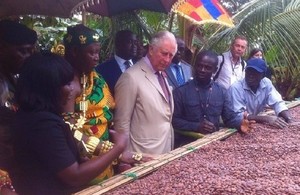HRH Prince of Wales hears how UK aid is helping cocoa farmers
During a visit to Ghana HRH visited a sustainable cocoa farm, an industry championed by UK aid.

HRH The Prince of Wales visiting a cocoa farm in Ghana that is supported by UK aid. Picture: Philip Smith/DFID.
HRH The Prince of Wales has visited a cocoa farm in Ghana to see how UK aid is helping farmers across the country to produce sustainable chocolate, create jobs, and reduce the impacts caused by climate change.
The cocoa products these farmers produce are being sold to companies selling chocolate bars and sweets in the UK – including Cadburys, Mars and Nestlé.
Ghana and Cote D’Ivoire jointly account for over two thirds of global cocoa production, but also suffer from one of the highest deforestation rates in Africa.
Cocoa farming is also under threat from increasing temperatures - putting thousands of livelihoods at risk.
In Ghana, UK aid is supporting over 70,000 cocoa farmers to become more resilient to the impacts of climate change and therefore better able to cope by using climate-smart cocoa agriculture which can protect against floods or drought.
Minister for Africa Harriett Baldwin said:
Thanks to UK aid, farmers in Ghana are learning sustainable farming techniques which protect cocoa crops from rising temperatures and the world’s leading cocoa and chocolate companies have committed to working to end deforestation and forest degradation.
This project which HRH The Prince of Wales visited today helps to illustrate how our vital support is ensuring the longevity of the cocoa industry for this generation and many more to come. This is a win for Ghana and a win for the UK.
The sustainably grown cocoa is also preserving the natural environment in Ghana, the Ivory Coast and Liberia, including critical wildlife habitats of the chimpanzee, and the natural resources local people depend upon.
UK aid’s support is expected to lead to almost £100 million of investment by the private sector in sustainable, climate resilience cocoa production – with the potential to create thousands more jobs in the future.
The UK is leading efforts bringing governments, industries and communities together to address deforestation in the cocoa supply chain, through the Cocoa and Forests Initiative (CFI).
The Cocoa and Forests Initiative, launched by HRH The Prince of Wales in March 2017, sets out agreed actions – by the Governments of Ghana and Cote d’Ivoire, and 35 of the world’s leading chocolate and cocoa companies – to end deforestation and restore forests in the cocoa-growing regions of West Africa.
Today HRH was briefed by the governments of Ghana and Côte d’Ivoire and leading chocolate and cocoa companies on progress made in ending deforestation.
Notes to editors
-
In March 2017, HRH The Prince of Wales convened a meeting in London of the World Cocoa Foundation and The Sustainable Trade Initiative and 12 of the world’s largest chocolate and cocoa companies. During the meeting all the companies launched a statement of intent to end the deforestation of rainforests in their supply chain. Ministers and senior government representatives of Cote d’Ivoire, Ghana, Germany, Holland, France, Switzerland, Norway and the U.K. attended the meeting. To read The Prince’s speech from March 2017 visit https://www.princeofwales.gov.uk/speech/speech-hrh-prince-wales-meeting-cocoa-and-tropical-forests-spencer-house-london
-
The Cocoa and Forests Initiative sets out the public-private actions on commitments on forest protection, sustainable cocoa production and farmer livelihoods.
-
UK aid has invested £387,000 to support the CFI, which has mobilised £775,000 of investment by the private sector.
-
UK aid has brought together over 500 stakeholders, including chocolate and cocoa companies, high-level government officials, development partners, environmental and civil society organizations, as well as farmer groups. Action is now being taken to put this commitment into practice.